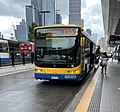| Route | Destinations | Type | Upgrade Date |
|---|
| 100 | Forest Lake via Woolloongabba busway station, PA Hospital, Ipswich Road, Oxley and Inala | Cityxpress | 31 October 2011 (2011-10-31) [9] |
| 120 | Garden City bus station via Tarragindi, QEII Hospital and Griffith University Nathan Campus | Cityxpress | 6 June 2011 (2011-06-06) [10] |
| 130 | Parkinson via Mains Rd, Sunnybank and Algester | Cityxpress | 27 January 2004 (2004-01-27) [11] |
| 140 | Browns Plains bus station via Mains Rd, Sunnybank and Beaudesert Rd | Cityxpress | 23 February 2009 (2009-02-23) [5] |
| 150 | Browns Plains bus station via Runcorn and Stretton (Gowan Rd and Warrigal Rd) | Cityxpress | 8 November 2004 (2004-11-08) [12] |
| 180 | Garden City bus station via Greenslopes and Mansfield | Cityxpress | 31 October 2011 (2011-10-31) [9] |
| 196 | Fairfield, Highgate Hill, South Brisbane, Fortitude Valley, Merthyr | All stops | 6 June 2011 (2011-06-06) [10] |
| 199 | West End ferry wharf, South Brisbane, Fortitude Valley, New Farm, Teneriffe ferry wharf | All stops | 20 February 2006 (2006-02-20) [13] |
| 200 | Carindale Heights via Woolloongabba busway station, Old Cleveland Road (stopping only at Coorparoo, Carina and Camp Hill) and Carindale Interchange | Cityxpress | 18 February 2006 (2006-02-18) [14] |
| 222 | Carindale via Eastern Busway and Old Cleveland Road (stopping only at Coorparoo, Kismet Street, Carina and Camp Hill) | Busway service | 27 August 2011 (2011-08-27) |
| 330 | Bracken Ridge via Roma Street, RBWH, Northern Busway, Chermside, Zillmere and Taigum (no stops between RBWH and Chermside, Airport Link Tunnel Express) | Cityxpress | 18 June 2012 (2012-06-18) [15] |
| 333 | Chermside bus station via Roma Street, RBWH, Northern Busway, Lutwyche and Kedron | Busway service | 27 August 2011 (2011-08-27) |
| 340 | Carseldine via Roma Street, RBWH, Northern Busway, Lutwyche, Kedron, Chermside and Aspley | Cityxpress | 18 June 2012 (2012-06-18) [15] |
| 345 | Aspley via Roma Street, Kelvin Grove, Newmarket, Stafford and Maundrell Tce | Cityxpress | 20 February 2006 (2006-02-20) |
| 385 | The Gap via Waterworks Rd, Bardon, Paddington and Roma Street | Cityxpress | 20 February 2006 (2006-02-20) |
| 412 | University of Queensland bus station via Toowong | Cityxpress | 23 October 2006 [16] |
| 444 | Moggill via Toowong, Indooroopilly and Kenmore | Cityxpress | 23 October 2006 [16] |




